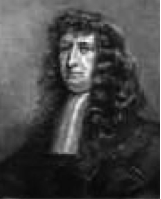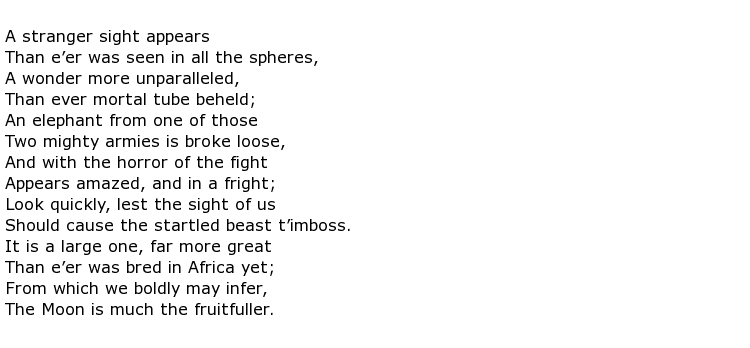 Samuel Butler was a 17th century English poet who favoured a satirical, sometimes humorous style of writing. He is best known for an epic piece of work that cruelly satirised sectarian religions. Hudibras was begun in 1658 and two further parts were written and published, the final section not been completed until 20 years after it had begun. The diarist Samuel Pepys, having bought the first two parts, acknowledged that while this work was undoubtedly of the “greatest fashion” he could not quite see why so many people described it as “witty”. Butler had many admirers though, including King Charles II himself. In fact the King was so impressed with the work that he awarded the writer an annual pension of £100 per annum. Alas, Butler still managed to die in poverty for reasons that are not clear.
Samuel Butler was a 17th century English poet who favoured a satirical, sometimes humorous style of writing. He is best known for an epic piece of work that cruelly satirised sectarian religions. Hudibras was begun in 1658 and two further parts were written and published, the final section not been completed until 20 years after it had begun. The diarist Samuel Pepys, having bought the first two parts, acknowledged that while this work was undoubtedly of the “greatest fashion” he could not quite see why so many people described it as “witty”. Butler had many admirers though, including King Charles II himself. In fact the King was so impressed with the work that he awarded the writer an annual pension of £100 per annum. Alas, Butler still managed to die in poverty for reasons that are not clear.
It is believed, though not confirmed, that Samuel Butler was born in February 1613 in the small town of Strensham, in the county of Worcestershire. He had a fairly modest upbringing, being the son of a farmer, but his family found the money to send him to the Kings School in Worcester. He may have attended university afterwards. As well as being a keen writer of verse he was also a painter, though his art did not find much favour amongst critics and art lovers alike. Indeed it was once said of his art that “his pictures served to stop windows and save the tax”, meaning that they were a good substitute for filling in the window frames instead of paying window tax.
Although Butler wrote a great deal of poetry he never seemed to make much money out of it and supplemented his income with such appointments as steward to the Earl of Carberry at Ludlow Castle in Shropshire. He was responsible for helping to restore the castle to its former glory having been sacked by the Parliamentarian forces during the Civil War. This period of employment coincided with the publication of the first part of Hudibras but he left Ludlow shortly after, in the early part of 1662.
Although the King favoured Butler’s work it was not enough to gain him a place at Court. In 1670 he found employment with the Duke of Buckingham, accompanying him on a diplomatic assignment in France. His great satirical work occupied much of his time though and it was certainly an indictment of the great religious fervour of that time. He was influenced in his writing by other satirists such as Paul Scarron and John Skelton.
Unfortunately very little of his work apart from Hudibras saw the light of day during his lifetime. He wrote a number of humorous pieces though, an example being The Elephant in the Moon. This is a story almost certainly way before its time, describing the monitoring by telescope of the Moon. Warring factions are “known” to reside on and below the Moon’s surface but the poem ends with the revelation that an incredibly large elephant-like creature can be seen. Here is the last verse:

The truth is though that a mouse had become trapped in the lens of the telescope, thus fooling the viewer into believing it was something quite different!
Samuel Butler died in September 1680, aged 67. Such was his stature as a writer that he was buried in St Paul’s Cathedral with a monument in his honour being placed in Westminster Abbey.

